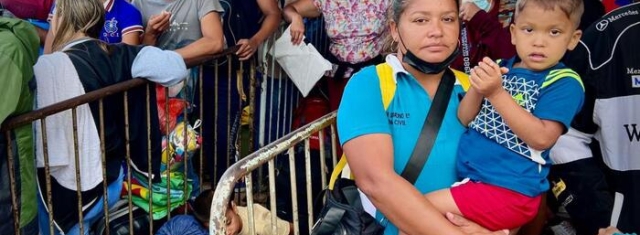News
VENEZUELAN REFUGEES, MIGRANTS, AND THEIR HOSTS NEED HELP FOR A BRIGHTER FUTURE
ReliefWeb Press Release

Venezuelan migrants line up upon arrival in Brazil (Source: © IOM Gema Cortes)
ARAC International Strategic Communications -
Sources: IOMUNHCR | Posted:14 Mar 2023 | Originally published:14 Mar 2023 |
The International Organization for Migration (IOM), and UNHCR, the UN Refugee Agency, urged today increased international support for refugees and migrants from Venezuela and the communities in Latin America and the Caribbean that host them.
The International Organization for Migration (IOM), and UNHCR, the UN Refugee Agency, urged today increased international support for refugees and migrants from Venezuela and the communities in Latin America and the Caribbean that host them.
Nearly 7.2 million Venezuelans have left their country in recent years. The vast majority, 6 million, are hosted by countries in Latin America and the Caribbean.
While various regularization and documentation initiatives have been implemented in the region, enabling access to vital rights and services for many, the international community needs to continue protecting refugees and migrants from Venezuela and investing in the communities hosting them.
Additional funding is required to support and complement the efforts made by neighboring countries to provide options and stability to Venezuelan refugees and migrants and their hosts. They must not be left behind amid the numerous humanitarian crises worldwide.
While various regularization and documentation initiatives have been implemented in the region, enabling access to vital rights and services for many, the international community needs to continue protecting refugees and migrants from Venezuela and investing in the communities hosting them.
Additional funding is required to support and complement the efforts made by neighboring countries to provide options and stability to Venezuelan refugees and migrants and their hosts. They must not be left behind amid the numerous humanitarian crises worldwide.
Venezuelan refugees and migrants in the region continue to struggle to meet their most basic needs, including food, health care, education and housing. The increasing cost of living, the fallout from the COVID-19 pandemic, lack of documentation or regularized status, and high unemployment rates have left them particularly vulnerable.
Now is the time for action, to think of solutions and invest in those who have found opportunities in neighboring countries, while continuing to provide emergency assistance to the most vulnerable and those on the move as well as enhancing the support to the communities in Venezuela welcoming those who decide to return.
The Government of Canada and the European Union will co-host the high-level International Conference in Solidarity with Venezuelan Refugees and Migrants and their Host Countries and Communities on 16 and 17 March in Brussels, together with IOM and UNHCR, co-leads of the Regional Inter-Agency Coordination Platform for Refugees and Migrants from Venezuela (R4V).
Now is the time for action, to think of solutions and invest in those who have found opportunities in neighboring countries, while continuing to provide emergency assistance to the most vulnerable and those on the move as well as enhancing the support to the communities in Venezuela welcoming those who decide to return.
The Government of Canada and the European Union will co-host the high-level International Conference in Solidarity with Venezuelan Refugees and Migrants and their Host Countries and Communities on 16 and 17 March in Brussels, together with IOM and UNHCR, co-leads of the Regional Inter-Agency Coordination Platform for Refugees and Migrants from Venezuela (R4V).
The conference will bring together host and donor governments, as well as key actors in the response, including international organizations, civil society, international financial institutions, and the private sector. It will include the participation of affected Venezuelan refugees and migrants.
Note to editors
For more information, please contact:
In Panama:
Gema Cortes, IOM marcortes@iom.int +507 6259 4574
William Spindler, UNHCR spindler@unhcr.org +507 6382 7815
In Brussels:
Ryan Schroeder, IOM (rschroeder@iom.int) +32 (0) 492 25 02 34
Maeve Patterson, (patterso@unhcr.org) +32 (0) 470 99 54 35
In Geneva:
Diego Perez, IOM (dperez@iom.int) + 41 +41795827235
Olga Sarrado Mur, UNHCR sarrado@unhcr.org +41 7974023047
=====================================================
ARAC International, Strategic Communications & Analysis
Global Security Analyst | Human Rights Consultant
In partnership with the U.S. Agency for International Development (USAID)
U.S. Institute for Diplomacy and Human Rights Consultant
Institute for Economics and Peace Ambassador
Member of the International NGO Safety & Security Association (INSSA)
Member of UN OCHA Humanitarian Response
https:/iep.arac-international.org
For more information, please contact:
In Panama:
Gema Cortes, IOM marcortes@iom.int +507 6259 4574
William Spindler, UNHCR spindler@unhcr.org +507 6382 7815
In Brussels:
Ryan Schroeder, IOM (rschroeder@iom.int) +32 (0) 492 25 02 34
Maeve Patterson, (patterso@unhcr.org) +32 (0) 470 99 54 35
In Geneva:
Diego Perez, IOM (dperez@iom.int) + 41 +41795827235
Olga Sarrado Mur, UNHCR sarrado@unhcr.org +41 7974023047
=====================================================
ARAC International, Strategic Communications & Analysis
Global Security Analyst | Human Rights Consultant
In partnership with the U.S. Agency for International Development (USAID)
U.S. Institute for Diplomacy and Human Rights Consultant
Institute for Economics and Peace Ambassador
Member of the International NGO Safety & Security Association (INSSA)
Member of UN OCHA Humanitarian Response
https:/iep.arac-international.org
more information: https://www.arac-international.org/2023/03/venezuelan-refugees-migrants-and-their.html
Liability for this article lies with the author, who also holds the copyright. Editorial content from USPA may be quoted on other websites as long as the quote comprises no more than 5% of the entire text, is marked as such and the source is named (via hyperlink).






